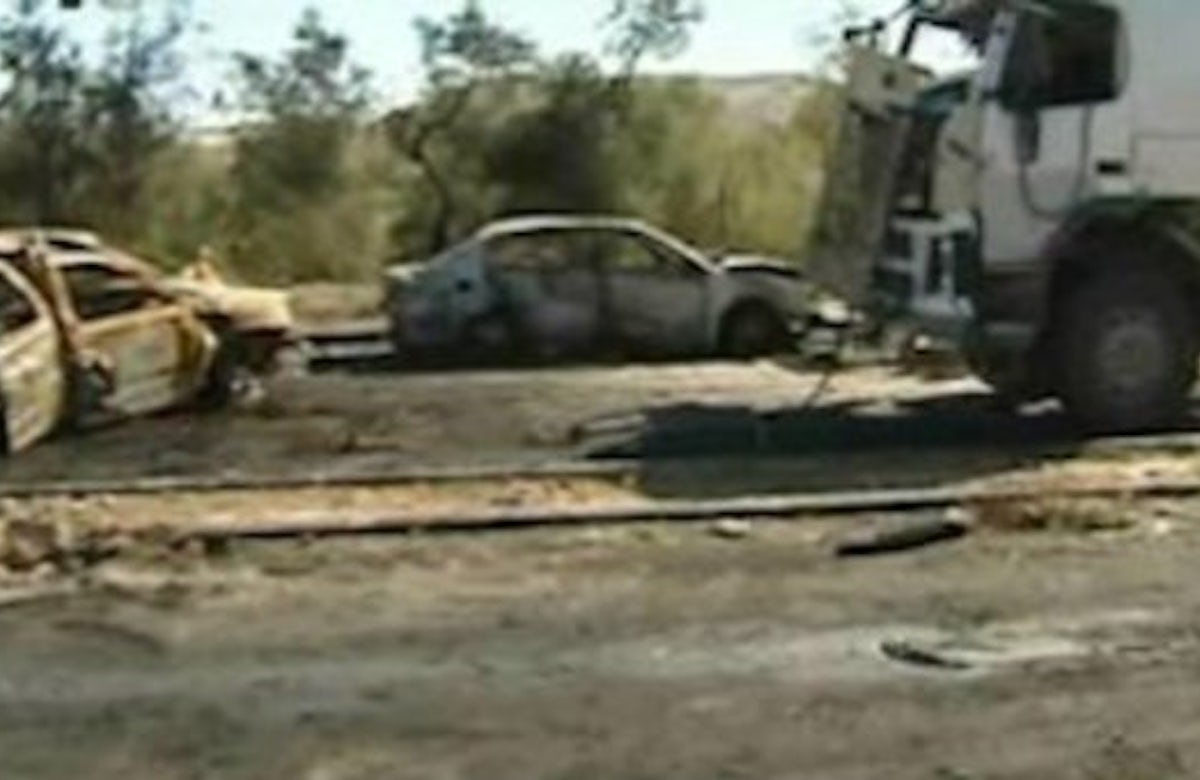By Pinhas Inbari
The reported Israeli military strike on a Syrian arms convoy destined for Hezbollah in Lebanon and the non-conventional weapons production center near Damascus has put the Jewish state in the midst of the Syrian conflict. Israel can no longer afford the luxury to view the war across its border with indifference. It must hurry and decide what kind of Syria it would like to have on its doorstop, as other powers have already been trying to bend Syria’s political future to their ends, which do not serve Israel either politically or on matters of security. In the best-case scenario the linkage between Iran, Syria and Lebanon would be severed.
 Regional actors have already embarked on a number of policies to influence Syria. Turkey and Qatar aim to establish a Muslim Brotherhood regime in Damascus similar to those in Gaza, Egypt and Tunisia. Saudi Arabia has put its weight behind the Salafist Jihadists and the Nusra terrorists (i.e. al-Qaeda). The Saudis share Turkey and Qatar’s desire to topple the Assad regime but disagree on the choice of his replacement. While they do not have a particular regime change formula in mind, above all the Saudi kingdom does not want the Muslim Brotherhood to get the upper hand.
Regional actors have already embarked on a number of policies to influence Syria. Turkey and Qatar aim to establish a Muslim Brotherhood regime in Damascus similar to those in Gaza, Egypt and Tunisia. Saudi Arabia has put its weight behind the Salafist Jihadists and the Nusra terrorists (i.e. al-Qaeda). The Saudis share Turkey and Qatar’s desire to topple the Assad regime but disagree on the choice of his replacement. While they do not have a particular regime change formula in mind, above all the Saudi kingdom does not want the Muslim Brotherhood to get the upper hand.
A few weeks ago, it was reported that an Egyptian Muslim Brotherhood terrorist cell was arrested in the Gulf just before it was able to carry out a series of attacks designed to shake the stability of the region. Accordingly, al-Qaeda’s forces in Syria are not advancing an agenda of their own, but are rather spreading anarchy to prevent the takeover of the Muslim Brotherhood.
Both scenarios are bad for Israel, be it a strong proto-Turkish rule of Afghan-style jihadist anarchy.
To make matters worse, there is a possibility of the two scenarios colliding. For example, al-Qaeda’s Nusra forces’ headquarters are located in Istanbul. So, while Turkey is a major Muslim Brotherhood backer, it has not ruled out possible cooperation with the Salafists. In fact, with the Nusra forces established as the predominant military force within the Syrian opposition, it has become a de facto armed wing of the Muslim Brotherhood.
Worse still, the Muslim Brotherhood has been recently cozying up to Iran. Therefore, a Muslim Brotherhood regime in Syria, backed both by hostile Turkey and belligerent Iran – with a touch of Salafist Jihadists – would be a nightmare for Jerusalem.
Outlandish as it may seem, this scenario is firmly grounded in reality. One look at the Muslim Brotherhood leader Muaz al-Khatib, who wears an open shirt with no tie, à la mode in Iran, suggests a very conscious emulation of President Ahmadinejad. Last weekend, al-Khatib went further by openly supporting the Russian-Iranian proposal to solve the current crisis in Syria by suggesting that President Assad remain as head of state in the interim period.
 With Hamas in Gaza engaged in a similar game with Iran, the time has come for Israel to consider its allies in the region and search for a favorable solution to the Syrian crisis. First, the danger posed by both possible outcomes in Syria to Israel is shared by Israel’s neighbor Jordan. Furthermore, despite their help to the Salafist forces in Syria, Saudi and Gulf states' actions in that country are destructive rather than productive, for they do not bring a tangible solution but only attempt to destroy the undesirable outcome.
With Hamas in Gaza engaged in a similar game with Iran, the time has come for Israel to consider its allies in the region and search for a favorable solution to the Syrian crisis. First, the danger posed by both possible outcomes in Syria to Israel is shared by Israel’s neighbor Jordan. Furthermore, despite their help to the Salafist forces in Syria, Saudi and Gulf states' actions in that country are destructive rather than productive, for they do not bring a tangible solution but only attempt to destroy the undesirable outcome.
Saudi Arabia is working to make sure a centralist Syria ruled by the Muslim Brotherhood and linked to either Turkey or Iran does not materialize. Therefore, it would be possible for Israel, Jordan, and Saudi Arabia to find common ground and a new formula for a federated Syria that would allow power-sharing by its various ethnic and religious groups.
This formula is heavily favored by the Kurds, but can find support among other minorities in the country, including the Sunnis in Aleppo. Even the Alawites, who now control the army, may come to recognize the benefit of putting an end to the conflict through power-sharing, which would halt the bloodshed before it enters the Alawite coastal region.






